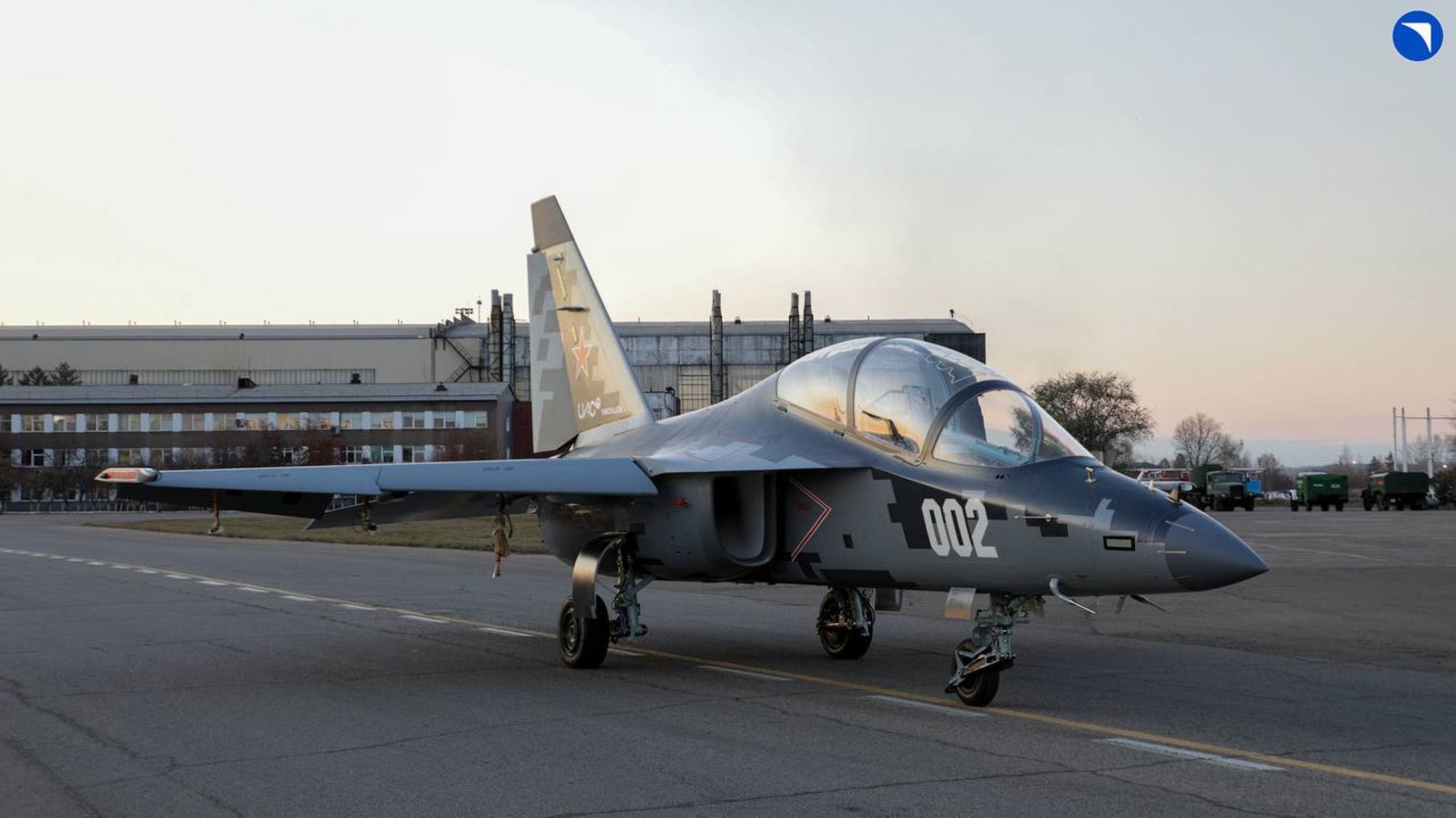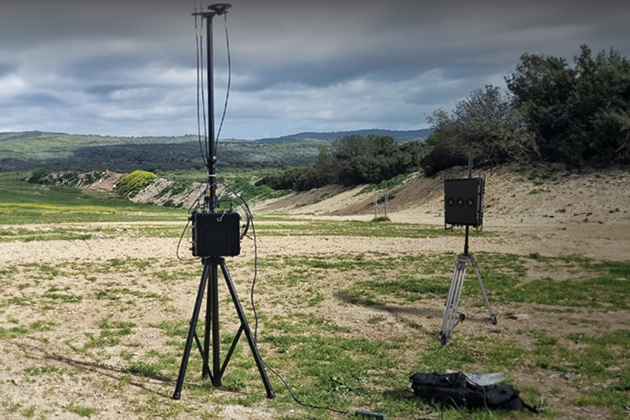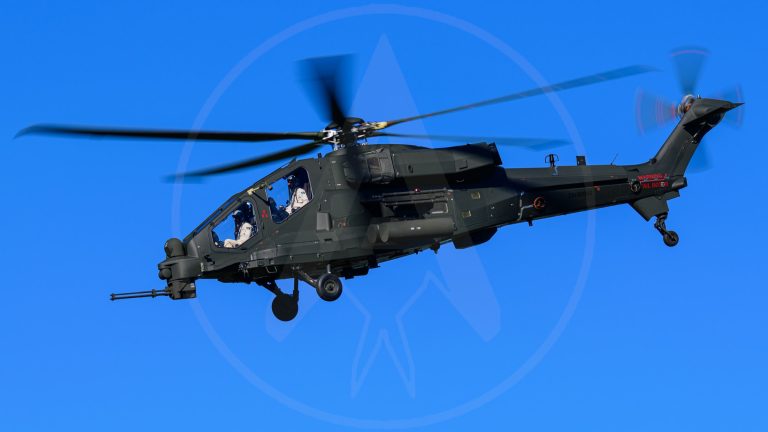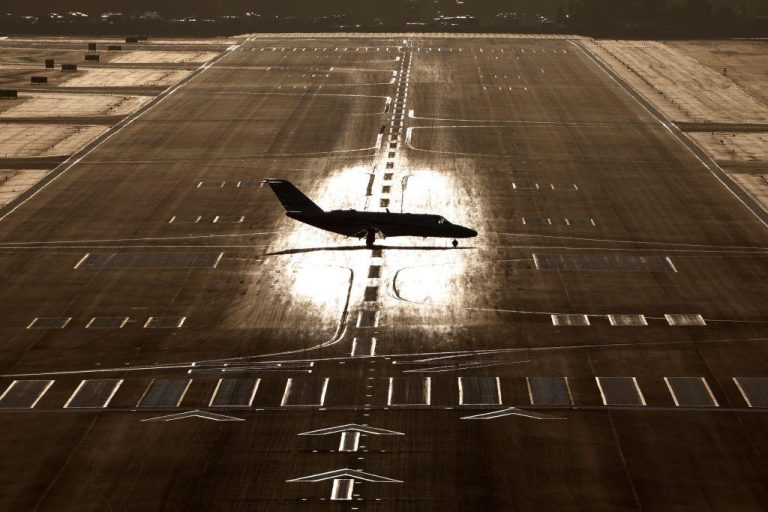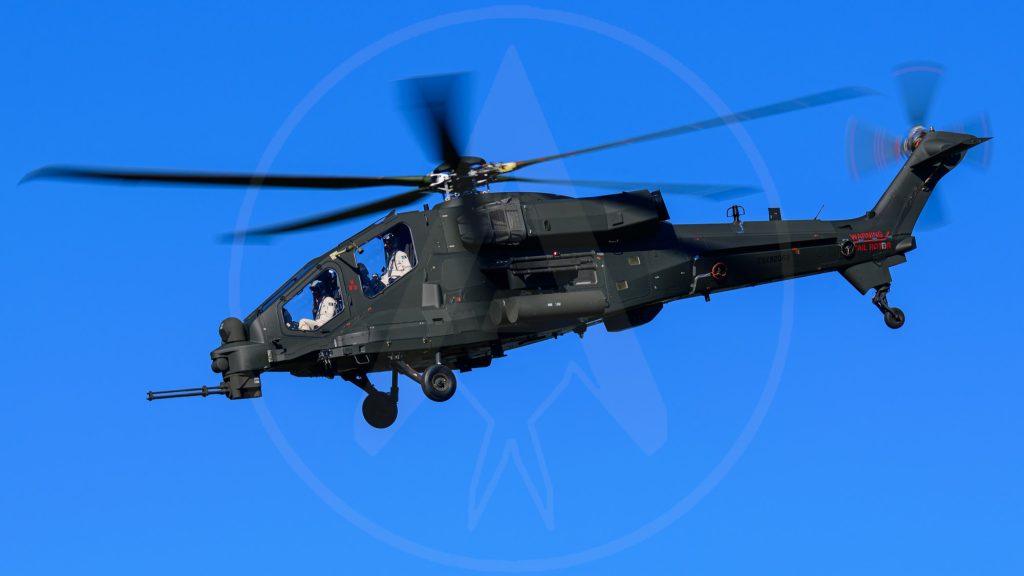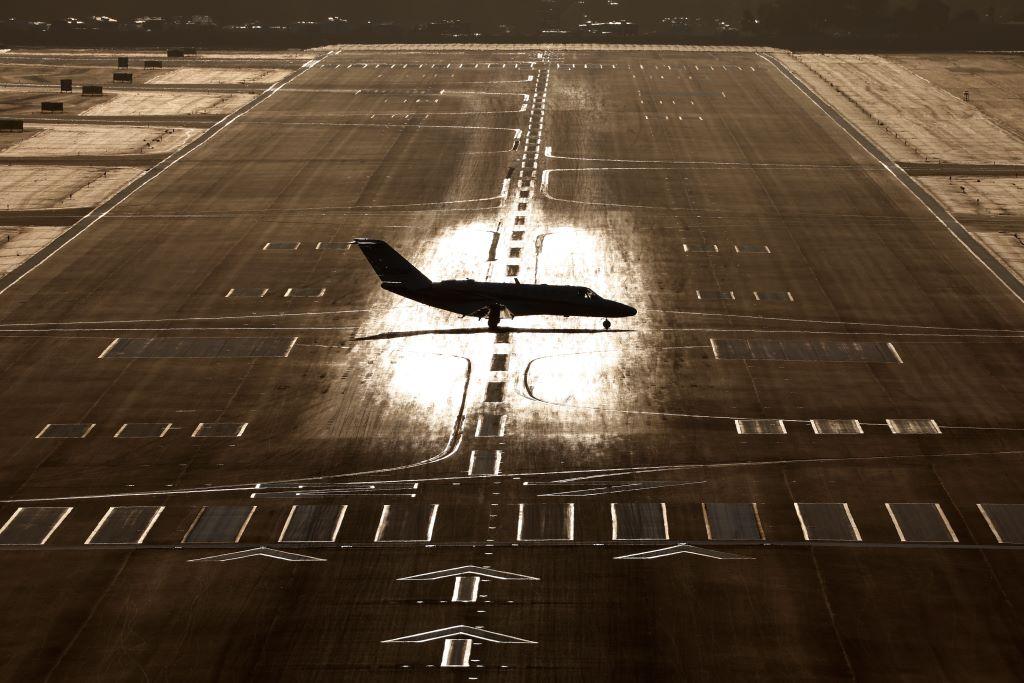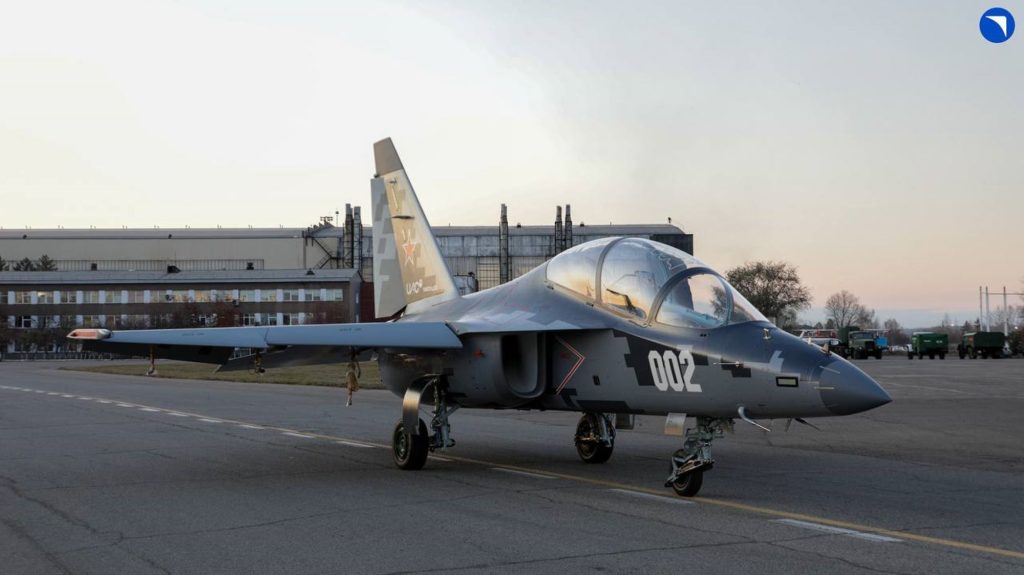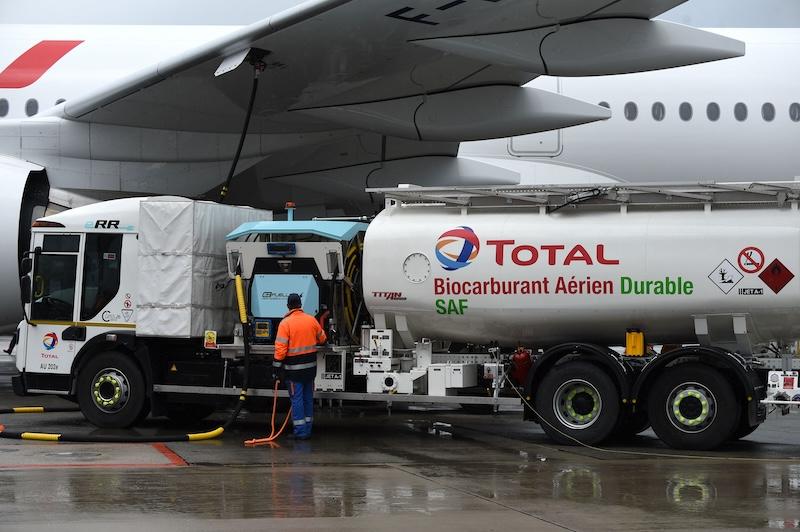The Yak-130M sports a host of upgrades, including an advanced AESA radar, avionics, radio communications and targeting suites.
One year after Russia’s United Aircraft Corporation (UAC) presented the upgraded Yak-130M trainer and light fighter aircraft concept, the company unveiled its second manufactured prototype. The aircraft ‘002’ sported a light and dark-grey pixelated livery with UAC and Russian Aerospace Forces’ ‘Red Star’ markings, and is set to begin soon ground and taxi trials.
Reports said a total of three prototypes are planned, with ‘001’ presented as the first concept prototype, manufactured at the Irkutsk Aviation Plant in Moscow. UAC and Russian media have officially identified an advanced AESA (Active Electronically Scanned Array) radar, avionics, radio communications and targeting suite upgrades for the Yak-130M.
This reflects the aggressive push in the highly competitive global market for the advanced jet trainer and light fighter segment, generally used by smaller regional powers, developing and under-developed countries. UAC executives also said the Yak-130M’s development was influenced by current ongoing conflicts.
Completion of the second prototype of the Yak-130M aircraft✅
Specialists from the Yakovlev company have manufactured the second prototype of the Yak-130M training and combat aircraft as part of experimental design work. The aircraft is painted in the traditional pixel… pic.twitter.com/zQkP9KQfik
— 𝐃𝐚𝐯𝐢𝐝 𝐙 🇷🇺 🇷🇺 (@SMO_VZ) October 23, 2025
Yak-130M’s second prototype
The UAC said in a Telegram post that the Yak-130M is “painted in the traditional pixel camouflage used in Russian aviation.” The post further added “subsequently, the aircraft will join ground and flight tests. Meanwhile, assembly of the third unit is underway.”
The company identified the new systems installed as the BRLS-130R AESA “onboard radar station,” the SOLT-130K “four-in-one optical-laser-thermal-television system,” the President-S130 “onboard defense complex” with a Missile Approach Warning System, Radar Warning Receivers, active jammer and a countermeasure dispenser, and the KSS-130 communication system. “The integration of new onboard systems will allow the Yak-130M to be used for training and combat purposes around the clock and in difficult weather conditions,” the UAC said.
Russia presents Yak-130M: A modernized aircraft for both training and combat missions
The Yakovlev Company has presented its design for the Yak-130M combat trainer aircraft with enhanced capabilities at the Army 2024 International Military-Technical Forum, chief designer Dmitry… pic.twitter.com/dA4YyCrCOH
— Sputnik (@SputnikInt) August 14, 2024
At the Army 2024 exhibition in Russia, UAC executives also said that they have modernized the Yak-130M’s “engine control system complexes,” and reiterated nearly all components and spares have been indigenized, following Western sanctions after February 2022. The jet can carry a total of 2,500 kg of external payload on nine hardpoints, and B-8M1 20-round rocket pods were also shown as a part of its payload at Army 2024.
UAC said the “second prototype” of the Yak-130M “training and combat aircraft” is a “part of experimental design work.” This suggests small-scale industrial activities and possibly a limited acquisition by the RuAF (Russian Aerospace Forces) to demonstrate its operational effectiveness.
It must be noted that the RuAF already uses the Su-25 Frogfoot ground attack jet in Ukraine. The Su-25 is also in use by the Ukrainian, Belarussian and Azerbaijani air forces, with significant effectiveness in frontline tactical CAS (Close Air Support) with both guided and unguided munitions.
Russia’s United Aircraft Corporation (UAC), and Yakolev unveils the Yak 130M combat training aircraft at the #Army2024
• New advanced Multi-Mode Radar
• Advanced sensors and expanded envelope of armament, including 4x electronic warfare pods
• New communication systems pic.twitter.com/VKKIlL4Fph— Military Africa (@militaryafrica) August 15, 2024
“The Yak-130M was developed based on the analysis and generalization of aviation experience in local and regional conflicts. The creation of light combat aircraft based on training-combat machines aligns with global trends in the development of military aviation,” Dmitry Popov, the Yak-130M’s deputy chief designer said in the UAC release.
Yak-130M’s future
The Yak-130M’s competitors in the advanced jet trainer and light fighter segment include the KAI (Korea Aerospace Industries) FA-50, the Leonardo M-346, and future planned iterations of the Turkish Hurjet.
طبق مصاحبه آقای رومن تاسکاف همچین چیزی اسمشه تست پایلوت (خلبان آزمایش گر ) شرکت هواپیمایی متحد روسیه UAC سه پروتوتایپ (پیش نمونه) هواپیمای تهاجمی سبک و آموزشی YAK-130M ساخته شده و در حال گذراندن آزمایشات خود است.
حالا این جنگنده چیست؟
خب این جنگنده همان یاک ۱۳۰ است که یک… pic.twitter.com/irMnTXdFDj— Reza_Mad (@maysam21901) October 14, 2024
“The Yak-130M is being created on the basis of the Yak-130, whose characteristics allow for training pilots of fourth and fifth generation fighters. The main goal of the ongoing modernization is to expand the combat capabilities of the aircraft. The updated aircraft will be able to be armed with air-to-air and air-to-surface missiles,” the UAC statement added.
Their weaponization with both air-to-air and surface-strike munitions makes them effective point and area defense aircraft, meant to tackle both enemy fighters, ballistic and cruise missiles and drones. Some analysts also classify them as LIFT (Lead-In Fighter Trainers).
The UAC’s plan to enhance the Yak-130M’s marketability for this role by operational use in the Russia-Ukraine war would therefore only materialize if the RuAF acquires it. The Yak-130M’s BRLS-130R AESA radar fused with the R-77M BVR (Beyond Visual Range) air-to-air missile would also help unburden Russia’s overstretched homeland air defense systems.
Ukraine has reasonable success in exploiting these problems, delivering some deep, painful strikes into Russian cities and airbases with old Soviet-era Strizh high-speed drones.
The SOLT-130K targeting pod for Yak-130M is a new version of the SOLT-25 system, originally developed by the Krasnogorsk Plant (ZENIT) for Su-25SM3.
It includes:
gyroscopic stabilization,
video camera,
thermal imaging camera (MWIR, 640×512 pixels),
laser rangefinder-designator, https://t.co/nMQR4l2dE1 pic.twitter.com/WHtIVCBWAa— H. Memarian (@HEMemarian) October 10, 2025
The IRIAF (Islamic Republic of Iran Air Force) became the Yak-130’s latest customer in September 2023, when two of the first aircraft delivered were captured in official images sporting Iranian national and IRIAF livery. Since then, the IRIAF Yak-130 has been spotted with a Russian R-73E short-range AAM and has shot down drones in exercises.
This allowed a version of the point/area defense mission to be demonstrated, albeit against a simple target like a drone and by the baseline trainer version. However, the IRIAF’s primary role for the Yak-130 is to train pilots for the long-awaited Russian Su-35S and the vintage F-4E Phantom IIs and F-14 Tomcats – while they are still around.
The Yak-130 is also used in Algeria, Vietnam, Bangladesh, Belarus, Myanmar and Laos.
An IRIAF Yak-130 trainer carrying an R-73 training round, likely near Isfahan airbase.
It carries serial no. 106, meaning IRIAF has at least 6 Yak-130s in service. pic.twitter.com/cwsL2lBSKh
— Aᴍɪʀ (@AmirIGM) December 8, 2024
Yak-130
The Yak-130 was originally a collaborative project between the YDB (Yakovlev Design Bureau) and Italy’s Aermacchi. While the project did not move forward, both countries proceeded with their individual programs, leading to similarly designed aircraft.
Rome’s M-346 Master entered service in 2010, produced by Leonardo, which incorporated Aermacchi. YDB’s Yak-130 meanwhile supplemented the aging fleet of Czechoslovakian Aero L-39 Albatross trainers.
The aircraft was inducted in the RuAF in July 2009. The first limited series aircraft were manufactured in May 2003, followed by flight tests of the final production variant in April 2004.
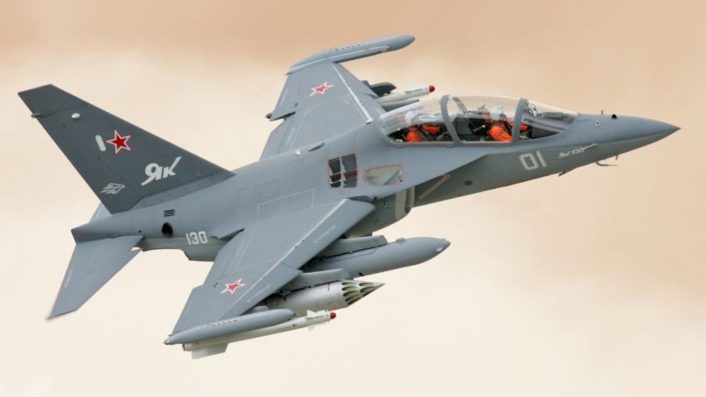

Official testing then took place in May 2005, and complete trials of the advanced combat trainer, including spin and combat tactics trials, were concluded in December 2009.
The first four of 12 Yak-130s reached RuAF units between February 2010 and April 2010, with other five aircraft delivered in April 2011, as per Russian reports. About 120 Yak-130s are reportedly now in service in the RuAF.

